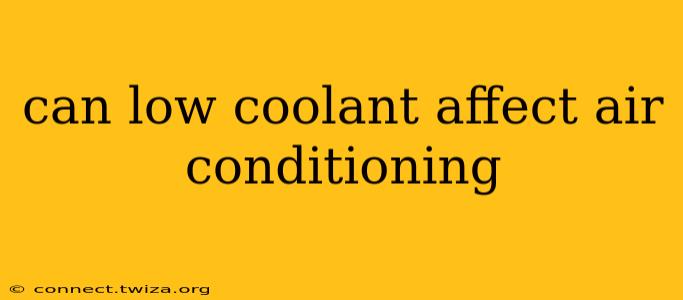Low coolant levels can indeed indirectly affect your air conditioning system, although they aren't directly related in the way many people might initially think. The connection lies in the engine's overall health and its impact on the AC compressor. Let's explore this relationship in more detail.
How is Low Coolant Related to Air Conditioning Problems?
The primary function of coolant (also known as antifreeze) is to regulate the engine's temperature. When coolant levels are low, the engine can overheat. This overheating can have several consequences that affect the air conditioning:
-
Compressor Damage: The AC compressor is driven by the engine. An overheated engine can put extra strain on the compressor, potentially leading to damage or failure. The compressor is a crucial component of the AC system; without a properly functioning compressor, your AC won't work.
-
Reduced Efficiency: Even if the compressor isn't damaged, an overheated engine can negatively impact the efficiency of the entire system. The AC compressor might struggle to perform optimally, resulting in weaker cooling performance.
-
Electrical Issues: Extreme overheating can cause electrical problems throughout the vehicle, potentially affecting the AC's electrical components and leading to malfunctions.
Can Low Coolant Directly Affect the AC Refrigerant?
No, low engine coolant does not directly affect the AC refrigerant. These are two entirely separate systems with different functions and refrigerants. Confusing the two is a common misconception.
What are the Symptoms of Low Coolant?
It's important to be aware of the symptoms of low coolant to prevent potential damage to your engine and air conditioning system. These symptoms can include:
- Overheating Engine: This is the most obvious sign. Your temperature gauge will likely rise significantly.
- Steam or White Smoke from the Exhaust: This indicates boiling coolant.
- Low Coolant Level in the Reservoir: Check your coolant reservoir regularly.
- Sweet Smell in the Cabin: This can be a sign of a coolant leak.
What are the Symptoms of AC Problems?
If you suspect a problem with your AC, look out for these symptoms:
- Weak or No Cooling: This is the most obvious sign of an AC problem.
- Unusual Noises from the AC System: Clicking, rattling, or hissing sounds could indicate issues with the compressor or other components.
- Warm Air Blowing from the Vents: This usually indicates a refrigerant leak or compressor problem.
How Can I Prevent AC Problems Related to Low Coolant?
Regularly checking your coolant levels is crucial. Top off your coolant as needed, using the correct type for your vehicle. If you notice any signs of a coolant leak, have it addressed promptly by a mechanic. Regular maintenance, including AC service, can also help prevent major issues down the line.
Is it possible for a failing AC system to indirectly lead to overheating?
While less common, a severely malfunctioning AC system could potentially contribute to minor overheating under extreme conditions. A compressor seizing could place an added burden on the engine, raising temperatures slightly. This is usually a less significant factor than the impact low coolant has on the AC.
By addressing potential coolant problems promptly, you can proactively prevent related issues that might impact your air conditioning system's performance and longevity. Remember, proactive maintenance is key to keeping your vehicle running smoothly.
